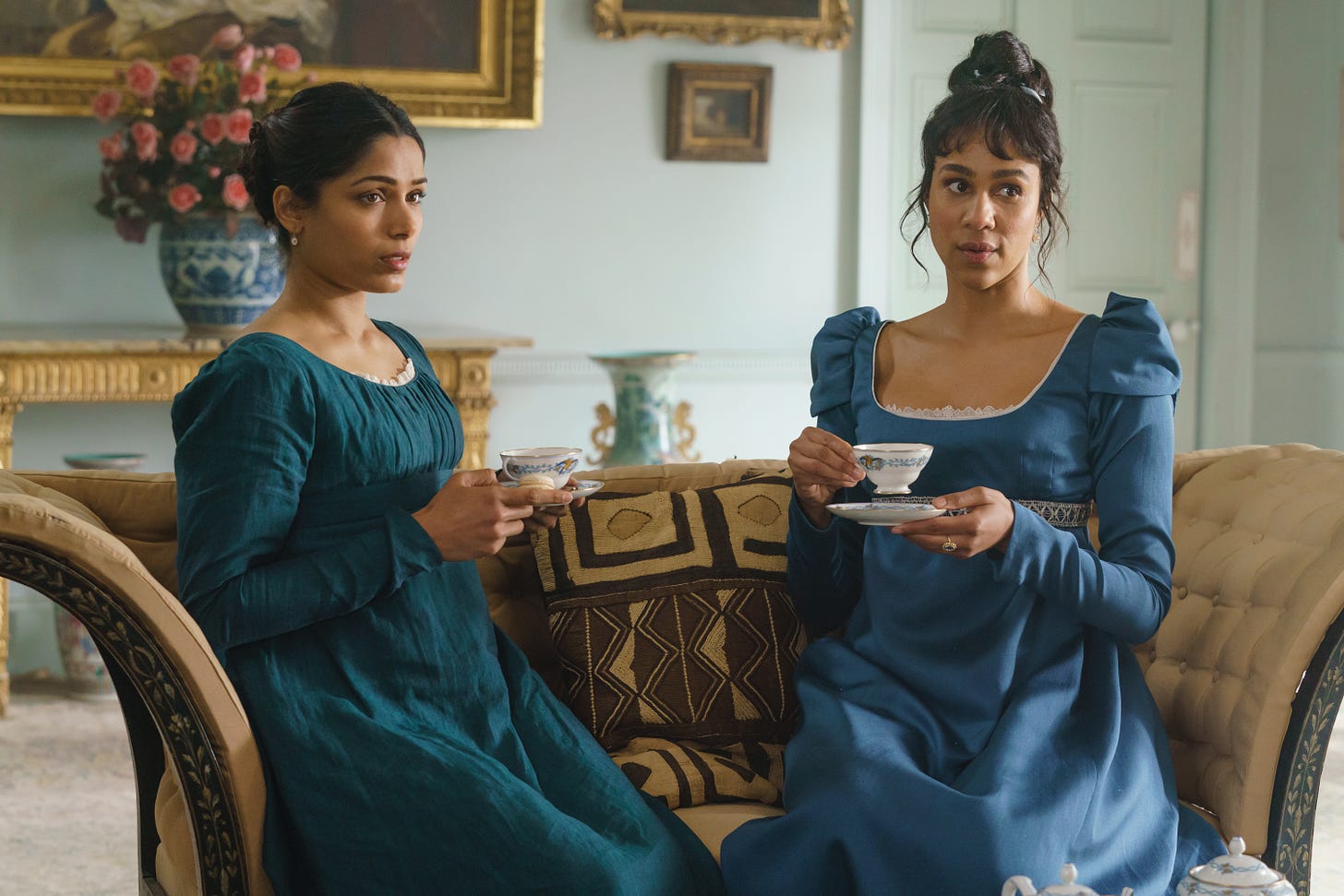In Review: 'Flux Gourmet,' 'Mr. Malcom's List'
Sonic caterers? A charming Jane Austen homage? Both await you in this week's reviews.
Flux Gourmet
Dir. Peter Strickland
111 min.
In the restaurant business, the mixing-and-matching of seemingly incongruous traditions into something harmonious and new is common, from lowbrow fare like Taco Bell’s Mexican Pizza or Applebee’s Chicken Wonton Tacos to the Michelin-starred novelties of New York’s Shalom Japan, which marries Japanese and Ashkenazi Jewish fare. Director Peter Strickland specializes in such hybrids of his own, like the distinctive combination of ‘70s sexploitation and domestic romance in 2014’s The Duke of Burgundy or the darkly comic, wildly experimental giallo tease of 2018’s In Fabric. It seems almost inevitable that he would get around to serving up a plate of fusion cuisine.
Like some of those dishes, Strickland’s new whatsit, Flux Gourmet, is fitfully inspired yet frequently baffling. It’s about a sonic catering collective that’s been granted a highly competitive residency at a rural institute “devoted to culinary and alimentary performance.” What, you might ask, the fuck is that? Basically, the collective is like a combination rock trio and performance art troupe, using sauté sizzles and whirring blenders to create abstract soundscapes to underscore a certain theme. For example, in their first concert at the institute, the group’s vegetarian leader, Elle (Fatma Mohamed), mimics a bloodied pig as her technicians, Billy (Asa Butterfield) and Lamina (Ariane Labed), toss food into pans on burners and fiddle with sound knobs. They’re told the assembled audience loved it, but part of the fun of Flux Gourmet is that we can apply no aesthetic standard to “sonic catering” because such a thing only exists in this movie.
The Reveal is a reader-supported newsletter dedicated to bringing you great essays, reviews and conversation about movies (and a little TV). While both free and paid subscriptions are available, please consider a paid subscription to support our long-term sustainability.
Of the many tensions within the film, the most pertinent seems directed at the awkward relationship between artists and their benefactors. The head of the institute, Jan (Gwendoline Christie), offers enthusiasm and encouragement to Elle and her unnamed band, but with the expectation that they be open to notes on their work. She’s not demanding changes per se, but she does feel like the residency she’s given them—so sought-after that one band resort to terrorism after getting rejected for it—entitles her to be heard. Elle refuses to compromise even that much, for fear of her financial underwriter damaging her artistic integrity. This might seem unreasonable, but Elle is right to suspect Jan’s motives, especially when she grows more intimate with the passive, shaggy-haired Billy.
There’s another subplot here about Stones (Makis Papdimitriou), a “dossierge” whose job is to document the collective like a journalist would, but who’s experiencing severe gastrointestinal distress. For that, he turns to an eccentric doctor (Richard Bremmer) in residence with poor bedside manner and a wine glass seemingly attached to his hand. The doctor’s treatment of the poor, embarrassed Stones becomes a performance piece in itself, calling to mind the time Roger Ebert publicly battled Vincent Gallo by saying he found footage of his colonoscopy more compelling than The Brown Bunny.
Strickland is a master of composition and sound, and of mining black comedy out of pristinely formalized abstraction. It takes a little time to get on his wavelength in Flux Gourmet, and even then, the considerable pleasures of the film are mostly incidental, tied to the inspired eccentricity of particular sequences or the deadpan wit of the dialogue. What’s missing from Flux Gourmet—and really, from all of Strickland’s films aside from the extraordinary The Duke of Burgundy—are any real emotional stakes, despite the volatility of the relationships. It is, like one of Elle and the gang’s numbers, an arresting and singular piece of performance art. But Strickland’s fusion cuisine could stand to be a bit earthier. — Scott Tobias
Flux Gourmet is in limited release and also available on VOD.
Mr. Malcolm’s List
Dir. Emma Holly Jones
118 min.
Discard the juvenilia and unfinished novels and Jane Austen’s bibliography consists of six novels published between the years 1811 and 1818, the last two after her death at the age of 41. They’re among the most adored and reread works in English literature and, for those who love them, it’s hard not to wish for more. It’s a truth universally acknowledged that culture tends in the direction of unmet needs, and beyond the many film and TV adaptations of Austen (including a new take on Persuasion arriving later this month) there’s been no shortage of romances set in the Regency era that bear her influence. But few films have channeled that influence as sincerely or comfortingly as Mr. Malcolm’s List, an easy-to-like first feature by Emma Holly Jones that often plays like the cinematic equivalent of the world’s best Jane Austen cover band.
Adapted from a self-published 2009 novel by Suzanne Allain, the film chronicles the romantic ups and downs of two graduates of Mrs. French’s Ladies Academy: the strong-willed, well-heeled Julia Thistlewaite (Zawe Ashton) and the more modest (and modestly moneyed) Selina Dalton (Freida Pinto). Selina’s all sense but Julia’s all sensibility, and when the latter becomes the subject of a cruel caricature after a truncated courtship with the extremely eligible but aloof-as-Darcy bachelor Jeremiah Malcolm (Sope Dirisu), she vows revenge. After learning that Malcolm maintains a list of must-have qualities for any woman he’d think of marrying—a kind of early 19th century version of the “she’s a 10 but…” meme, only with requirements like genteel relations and musical skill—Julia recruits Selina to prank him by posing as a woman who checks all those boxes. The twist: over the course of their not-so-dangerous liaisons Malcom finds himself truly falling for Selina and Selina responds in kind.
Allain and Jones sometimes feel like they’re also working from a checklist of Austenisms, from the shape of the story to witty dialogue to the appearance of a comically uncouth distant relation (Ashley Park, having a lot of fun). Austenisms, of course, are distinct from actual Austen, and the film never quite captures the whispering sting at the base of so much of her writing, the gentle suggestion that the world and its rules that she depicts so well might be do more to get in the way of happiness than to facilitate it, but it’s filled with fun characters and perfomances–made possible by determinedly colorblind casting–and charming entanglements and captures the very Austen way a word like “attraction,” when deployed at just the right moment, can carry an astounding amount of sexual heat. Mr. Malcolm’s List may not stray from the notes of a familiar song, but it plays that song well. —Keith Phipps
Mr. Malcolm’s List is in theaters today.









The description of Mr. Malcolm's List as playing old songs well is very accurate, but I feel like it has some Shakespeare comedy DNA mixed in with the Austen. Elements like duplicity and revenge, as well as the servant characters and the carnage or war and other seedy parts of life, are things which in Austen would be "understood" but not brought up so frankly.
This perfectly sums up how I feel about Strickland - skilled as hell as a director and doing really interesting work, but the whole package suffers because of a real lack of feeling. Would love to see him bring in a co-writer to help, uh, humanize the algorithm a little, so to speak, because if you added 20% heart to his stuff it'd be some real best in show stuff.